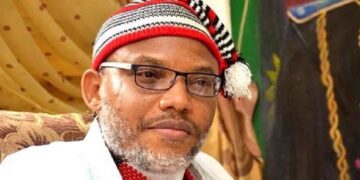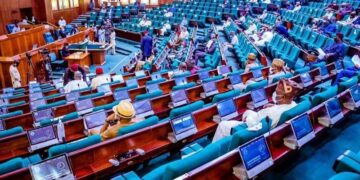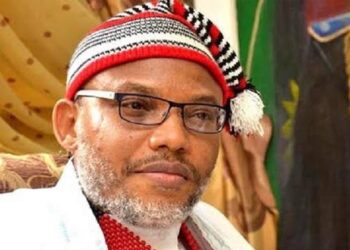By Eshioromeh Sebastian
Despite public outcry over allegations of a N6.93 trillion budget padding, the Presidency has moved to withhold funding for projects inserted into the budget by the National Assembly- a move that could fundamentally alter the balance between financial accountability and legislative overreach, Spear News can reveal.
Unlike previous administrations, President Bola Ahmed Tinubu appears determined to break the cycle of tolerance for budget manipulation. While lawmakers may believe their controversial insertions have secured another financial victory, authoritative presidency sources confirm the President has discreetly implemented rigorous monitoring systems designed to prevent any release of funds for questionable allocations.
A recent BudgIT report exposing 11,122 suspicious projects smuggled into the budget, including N393 billion for phantom streetlights and N114 billion for outrageously priced boreholes, has laid bare the audacity of lawmakers’ financial manipulation.
The audacity of the padding was staggering. Yet, while the public outrage grew, the presidency remained conspicuously silent, a silence that many misinterpreted as indifference. But insiders confirm that the President’s calm demeanour is not complacency; it is strategy, one that will systematically dismantle heist at implementation.
“The President knows this game too well,” a high-ranking official in the presidency disclosed. “He is aware that budget padding has become a tradition in the National Assembly, but this time, he has decided to play along, only to tighten the noose at the implementation stage.”
According to the source, President Tinubu has instructed the Budget Office and the Ministry of Finance to subject every release of funds to rigorous scrutiny. No money will be disbursed for any project that does not align with the original budgetary framework, regardless of how much pressure lawmakers apply.
The plan is simple: let the National Assembly have their moment of hollow victory, but the presidency will demand concrete justifications, feasibility reports, and precise locations, details that many of these padded projects conspicuously lack. “You can insert N10 billion for a phantom road in your village on paper, but if you can’t show where it is, who the contractors are, and how it fits into national development plans, you won’t see a dime,” the source added.
This approach is a sharp departure from previous administrations, where budget padding often went unchallenged, and funds were released without proper oversight. “Under Tinubu’s watch, the presidency has quietly strengthened the Government Integrated Financial Management Information System (GIFMIS), ensuring that every expenditure is tracked in real time. Ministries have also been directed to stick strictly to their original proposals, ignoring any last minute additions forced upon them by lawmakers”, a source told Spear News.
The Ministry of Agriculture, for instance, was burdened with an outrageous N1.72 trillion in insertions, inflating its budget by over 700%. But under the new directive, only the originally approved N242.5 billion will be accessible, the rest will remain on paper, a worthless trophy for greedy legislators. The same applies to the Ministry of Science and Technology, which saw its budget artificially bloated by N994 billion.
Even more telling is the fate of agencies like the Federal Cooperative College, Oji River, which was bizarrely assigned N3 billion for “utility vehicles to support farmers”, a responsibility far outside its mandate. Under the new enforcement regime, such laughable allocations will die a natural death, as no funds will be approved for projects that agencies cannot legally or technically execute.
Chairman of the Economic and Financial Crimes Commission, EFCC, Ola Olukoyode, recently disclosed that the anti-graft agency was closely monitoring the 2025 budget implementation by Ministries, Departments and Agencies, MDAs, towards ensuring that releases made to them are not stolen.
He made the disclosure on April 29, 2025 while addressing a delegation of the management team of Human and Environmental Development Agenda, HEDA.
“We are monitoring the MDAs, particularly on the implementation of the budget. If we can even do 50 percent of our capital budget, the country would be fine. There is no year that we have done up to 25 percent of our capital budget and releases are being made, but there’s no commensurate development. We are monitoring and tracking every kobo released. If we can do 50 percent of capital budget implementation, Nigeria will be fine infrastructure wise. So far, the first quarter has gone, and we are working to stop budget allocations of MDAs from being stolen. In sane societies, budget allocations are not stolen,” he said
The President’s strategy is not just about blocking fraudulent spending; it is also a subtle message to the National Assembly. By allowing them to expose their greed publicly—only to render their efforts futile—he is sending a clear signal that the era of unchecked budget manipulation is over. “Let them put whatever they want in the budget,” another insider quipped. “At the end of the day, the joke will be on them when they realise they’ve been outmanoeuvred.”
Of course, this does not mean the fight is won. The National Assembly still wields significant influence, and some lawmakers may attempt to pressure ministries or even threaten budget approvals in retaliation. But with the President’s firm stance and the growing public awareness sparked by BudgIT’s report, their usual tricks may no longer work.
For ordinary Nigerians, this could mark a turning point. If successfully implemented, the President’s stealthy oversight could ensure that the 2025 budget actually funds roads, schools, and hospitals—not the pockets of politicians. It may also set a precedent, forcing future lawmakers to think twice before turning the national budget into a personal ATM.
The real test, however, will come in the months ahead when the budget implementation begins. Will the presidency stand firm, or will political pressure force compromises? For now, one thing is clear: the National Assembly may have written their usual fairy tales into the 2025 budget, but President Tinubu is ensuring that this time, they won’t get to live happily ever after.
Over N14 Trillion Padded in 16 Years
Nigeria’s National Assembly has been embroiled in a staggering N14 trillion budget padding scandal over the past 15 years, with allegations of unauthorised insertions, inflated contracts, and opaque allocations running from 2010 to the present. The figure, compiled from documented controversies and projected estimates for 2025, exposes a deepening crisis of financial accountability in the federal legislature.
The scandal first gained national attention in 2016, when former House Appropriations Committee Chairman Abdulmumin Jibrin blew the whistle on a N481 billion padding scheme under then-Speaker Yakubu Dogara. Jibrin’s allegations, detailing thousands of phantom projects, led to his suspension rather than an independent probe, setting a precedent for impunity.
Since then, each year’s budget cycle has been marred by fresh accusations, with figures ballooning from N100 billion in 2010 to a projected N6.9 trillion in 2025.
Insiders claim the padding follows a well-worn playbook: lawmakers inflate line items, insert dubious “constituency projects,” or outright divert funds—often without scrutiny. In 2024, Senator Abdul Ningi’s claim of N3.7 trillion in “unallocated” funds sparked outrage, but his subsequent suspension silenced further debate. Critics argue the National Assembly’s control over its own oversight has turned budgeting into a “black box,” with civil society groups like BudgIT and CISLAC repeatedly flagging projects with no clear beneficiaries.
The cumulative N14 trillion—equivalent to half of Nigeria’s 2024 federal budget—underscores systemic rot.
With the 2025 budget already under discussion, fears persist that history will repeat itself. A recent BudgIT report has exposed 11,122 suspicious projects smuggled into the budget, including N393 billion for phantom streetlights and N114 billion for outrageously priced boreholes, has laid bare the audacity of lawmakers’ financial manipulation
The presidency, though constitutionally empowered to reject padded budgets, has consistently approved them after backroom negotiations. As public trust erodes, calls grow for an independent budget office and stronger whistleblower protections—but for now, the N13.9 trillion question remains: who will hold the National Assembly to account?












































Discussion about this post